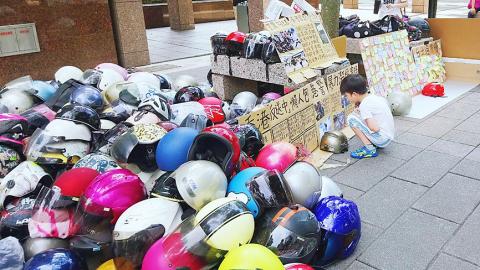A group of Hong Kongers studying in Kaohsiung on Saturday launched a helmet donation drive in support of anti-extradition bill protesters back home, and more than doubled their target of collecting 500 helmets within an hour, one of the organizers said yesterday.
Fooyin University senior Ariel Lam (林沛晞) said they wanted to do something after the protests in Hong Kong turned violent last week.
The protesters face a shortage of supplies, so she and her friends decided to collect second-hand helmets to offer protesters on the front lines better protection, Lam said.

Photo courtesy of Hong Kong Outlanders
Helmets are important because people clad in white shirts and police officers have hit protesters on the head, she said.
By the time the group had finished setting up their collection point in Kaohsiung at 4:30pm on Saturday, many people were already waiting in line to donate, she said.
They began accepting helmets at about 5pm and by 6pm they had 500 helmets, and by the time they closed the drive at 7:30pm they had collected more than 1,000, many of which were new, she said.
They also collected more than NT$100,000, which would go toward supporting the anti-extradition bill protests, she said.
Lam said she was touched by the enthusiasm of people in Kaohsiung and she had not expected so many people to donate.
They want to thank Kaohsiung residents for their generosity and support, as well as the Taiwan Statebuilding Party, formerly known as the Radical Wings, the New Power Party and other parties for helping promote Saturday’s event, she said.
A second drive was held on Sunday in Taipei’s Xinyi District (信義), with the aim of collecting 300 helmets.
The organizers are now looking for a way to send the helmets to Hong Kong, but they did not want to discuss the details to protect their peers, Lam said.
She hopes all Taiwanese can take in what is happening in Hong Kong, she said.
While some Taiwanese might question why Taiwan is at risk of ending up like Hong Kong, she hopes that when voting in next year’s presidential election, Taiwanese would not believe in Beijing’s “one country, two systems” arrangement or a pro-Beijing candidate, she added.

GAINING STEAM: The scheme initially failed to gather much attention, with only 188 cards issued in its first year, but gained popularity amid the COVID-19 pandemic Applications for the Employment Gold Card have increased in the past few years, with the card having been issued to a total of 13,191 people from 101 countries since its introduction in 2018, the National Development Council (NDC) said yesterday. Those who have received the card have included celebrities, such as former NBA star Dwight Howard and Australian-South Korean cheerleader Dahye Lee, the NDC said. The four-in-one Employment Gold Card combines a work permit, resident visa, Alien Resident Certificate (ARC) and re-entry permit. It was first introduced in February 2018 through the Act Governing Recruitment and Employment of Foreign Professionals (外國專業人才延攬及雇用法),

RESILIENCE: Deepening bilateral cooperation would extend the peace sustained over the 45 years since the Taiwan Relations Act, Greene said Taiwan-US relations are built on deep economic ties and shared values, American Institute in Taiwan (AIT) Director Raymond Greene said yesterday, adding that strengthening supply chain security in critical industries, enhancing societal resilience through cooperation and deepening partnerships are key to ensuring peace and stability for Taiwan in the years ahead. Greene made the remarks at the National Security Youth Forum, organized by National Taiwan University’s National Security and Strategy Studies Institution in Taipei. In his address in Mandarin Chinese, Greene said the Taiwan-US relationship is built on deep economic ties and shared interests, and grows stronger through the enduring friendship between

CAUTION URGED: Xiaohongshu and Douyin — the Chinese version of TikTok — are tools the Chinese government uses for its ‘united front’ propaganda, the MAC said Mainland Affairs Council (MAC) Minister Chiu Chui-cheng (邱垂正) yesterday urged people who use Chinese social media platforms to be cautious of being influenced by Beijing’s “united front” propaganda and undermining Taiwan’s sovereignty. Chiu made the remarks in response to queries about Chinese academic Zhang Weiwei (張維為) saying that as young Taiwanese are fond of interacting on Chinese app Xiaohongshu (小紅書, known as RedNote in English), “after unification with China, it would be easier to govern Taiwan than Hong Kong.” Zhang is professor of international relations at Shanghai’s Fudan University and director of its China Institute. When giving a speech at China’s Wuhan

ENHANCE DETERRENCE: Taiwan has to display ‘fierce resolve’ to defend itself for China to understand that the costs of war outweigh potential gains, Koo said Taiwan’s armed forces must reach a high level of combat readiness by 2027 to effectively deter a potential Chinese invasion, Minister of National Defense Wellington Koo (顧立雄) said in an interview with the Chinese-language Liberty Times (sister newspaper of the Taipei Times) published yesterday. His comments came three days after US Secretary of State Marco Rubio told the US Senate that deterring a Chinese attack on Taiwan requires making a conflict “cost more than what it’s worth.” Rubio made the remarks in response to a question about US policy on Taiwan’s defense from Republican Senator John Cornyn, who said that Chinese